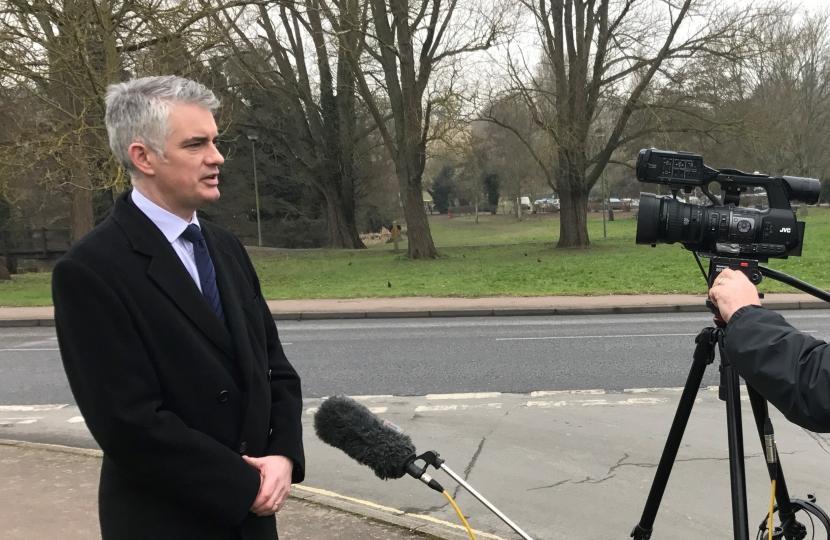
When I last wrote about a crucial vote on Covid related restrictions on 4th November, I said that the choice was not between ‘lockdown or no lockdown’ but between a national or regionalised, i.e. tier-based, approach. The Prime Minister had taken the view based on the medical advice that a national lockdown had become necessary because of actual growth in hospital admissions, and their inevitable sharp growth absent further restrictions. I therefore reluctantly backed that national approach as a ‘last resort’. I said that this was on the understanding that the measures were temporary and I backed them on that strict understanding. I’m pleased that we are therefore out of a uniform set of ‘national lockdown’ measures, which also appear to have helped (or coincided with) a fall in the overall infection rate and R, and that we have indeed returned to a tiered approach as promised.
The question is what takes their place. If today’s vote is lost by the Government there will be NO restrictions at all. So today’s vote is regional lockdown v no lockdown at all.
No lover of freedom, as most British people are, could fail to be moved by the tantalising prospect of living without any Coronavirus restrictions. The thought of properly going back to ‘normal’ is a prospect to bring a glow in continually difficult times. Yet, it must equally be obvious, that if we lost the vote and there were no restrictions that we would not be going ‘back to normal’. If we could suddenly go round to each other’s houses again as in pre-Covid times, and go to pubs, football matches etc as if there were no pandemic, then existing reservoirs of infection would not fall back but instead quickly gather pace. These would not be normal times because there would be consequences for hospital admissions and the health of so many in our society that the price paid for a complete relaxation – as tantalising as it may be – would quickly appear disproportionate, and anything but ‘normal’. For there is also no greater lover of freedom than this virus, which would like nothing better than a completely open route of transmission, to be able to reproduce without limit and in the process infect far higher numbers than at present. We cannot ignore the reality that for our freedom to be maximised, so must that of the virus. Restrictions on us are restrictions on its ability to spread, and there is no getting round that frustrating and terribly inconvenient but inescapable reality. In fact the statistical reality is that the latest ONS figures suggest that out of every 85 people in England, one has Coronavirus, far more than in the Summer. Without any restrictions the further spread would be significant.
Many have rightly mentioned the situation in Suffolk. We are in tier 2 when it is argued, with some justification, that our rate of infection is very low and we should be in tier 1.
My primary response to that is to say first and foremost that of course I would want Suffolk to be in tier 1, and in a recent call with Health Ministers and Eastern colleagues it was emphasised that Suffolk had come very close to tier 1. After all, we obviously all want the greatest freedom compatible with continued resilience against the virus. However, as the MP for South Suffolk including Hadleigh as its second town, I was struck by the sudden acceleration of spread in that part of the county that occurred earlier last month. We are now seeing a marked increase in our largest town, Ipswich. This is not to say that either should be a cause for alarm and our overall position remains low by national comparison, with the infection rate now apparently falling in Hadleigh (albeit slowly), though not yet in Ipswich. But one is bound to ask – would this growth of infection in Ipswich be curtailed by removing all restrictions overnight, were the Government to be defeated? Or would there be a high chance of that level of infection spreading more widely, with the rest of Suffolk then threatened by the kind of spike from minimal to high infection, as was the case in Hadleigh (bearing in mind not so long ago Babergh district had the lowest infection rate in England)?
To be clear, as I have repeated throughout this crisis, I am greatly troubled by the inherent and unavoidable economic impact of lockdown. Like the Prime Minister I see such steps as a regrettable but necessary imposition that no one would dream of if there weren’t the urgent need to restrict the R rate of the virus and protect public health. As a small business owner who just managed to ride out the last great recession after the credit crunch, I feel deeply for every employer and entrepreneur facing a substantive or total loss of trade – again, nobody would wish that on anyone without the pressing problem of the virus. And as PPS to the Chancellor I am proud of the quite extraordinary level of support that we have put in place to help every business, from Bounce Back Loans to grants to rates’ relief and so on.
I also have great sympathy with those tired of being told what to do in the minutiae of their lives. That said, back in regional tiers we do have the consolation of far more of the economy and society being open than in the national lockdown ending today. For example hair dressers, barbers and beauty salons can reopen; non-essential retail can open their doors in time for Christmas shopping; puppies can be taken to dog training classes; you can enjoy a substantial meal with your household in one of our excellent eateries; groups of up to six can meet outside in public places and gardens, and eat a meal outside a hospitality venue; gyms can open and outdoor fitness classes can take place; 15 guests can meet for a wedding; and accommodation venues can welcome back guests.
Finally, it must be remembered that ‘lockdown’ is just one part of our overall policy response, of which testing and a vaccine are the most important. Our policy is to suppress the virus until a vaccine is deployed. That important development does not seem far away. People may be concerned about the rapid time such a vaccine has taken to come forward but there is no way it will be approved if it is not safe, and it is worth reflecting that the dexamethasone treatment we are now using on our wards for people sick with Covid has saved lives, and was also developed at great pace. Such is the way when humanity is threatened, we adapt at speed, helped by the great resource the entire planet has put behind its scientists. I have great faith that on everything from testing to treatment to vaccines, the ingenuity of our scientists and clinicians will prevail. But this will not happen immediately. We have some weeks yet. For now, we should not assume that the very welcome downward curve of the infection is inevitable and we should certainly continue to do what is necessary to strike that very difficult balance between reopening the economy and society, and suppressing the spread of Covid to protect life. I will be voting to support regional tiers, a much preferable approach to a national lockdown, with the realistic hope that Suffolk will at some point be in tier 1.

